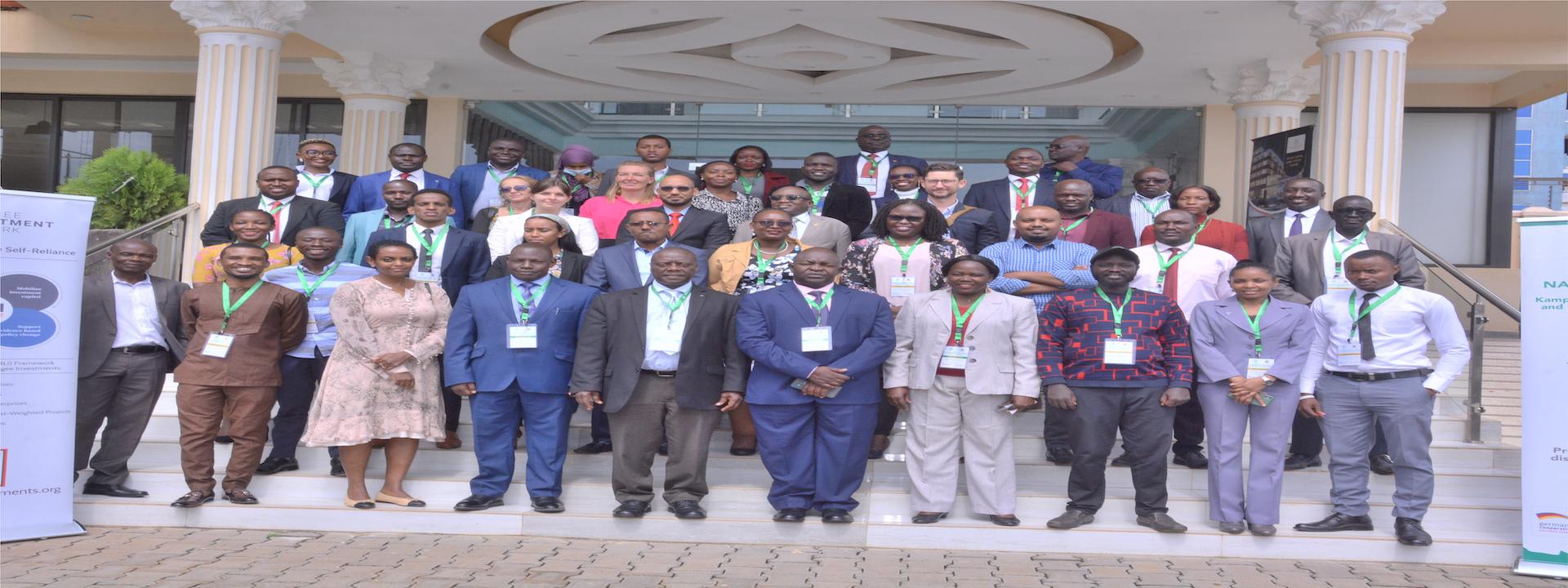September 23, 2023 (ENTEBBE, Uganda): The Intergovernmental Authority on Development (IGAD) yesterday concluded the Uganda national meeting on the Kampala Declaration on Jobs, Livelihoods and self-reliance for refugees, returnees and host communities.
This two-day Uganda national meeting brought together refugees and refugee representatives, representatives from the Office of the Prime Minister, CRRF Secretariat, Interior and Immigration, refugee hosting district administration, Foreign Affairs, Refugee Affairs, Labour, Social Protection, Planning, Finance and Treasury, Agriculture, Education/TVET, the private sector and particularly banking services providers and microfinance institutions engaged in displacement setting.
Organised in collaboration with Gesellschaft für Internationale Zusammenarbeit (GIZ) and the Refugee Investment Network (RIN), the main objective was to engage government and private sector counterparts, to take stock of the implementation of the declaration, identify national priorities and develop roadmaps that provide practical steps that relevant government departments and private sector actors can take to promote refugee economic inclusion and self-reliance.
Speaking at the opening session on September 21, Ms Otto Lucy, Principal Social Development Officer at Ministry of Gender, Labour and Social Development said: “Government of Uganda is committed to make the realization of self-reliance and resilience of refugees, returnees and host communities a reality through providing a conducive environment for them and implementation of the Jobs and Livelihood Integrated Response Plan with the Ministries, Departments and Agencies (MDAs), Refugee Hosting Districts, Private Sector, Partners and Refugees themselves. We are currently working with partners to develop minimum standard indicators for measuring Self-reliance of refugees and host-communities in Uganda.”
Ms Yemisrach Benalfew, Coordinator for the Strengthening of the IGAD Migration Policy Implementation Project (SIMPI) declared: “The Kampala declaration is a holistic commitment made by IGAD member states in 2019 to find durable solutions in the IGAD region. The national consultation is a testament of the role of various key stakeholders –government offices including from refugee hosting areas, private sectors, banks, refugee led organisations, and partners – to support the self-reliance of refugees in Uganda. Organised under the framework of the Nairobi Declaration and IGAD Support Platform, this first national meeting will highlight national achievements, priorities, and opportunities to invest on refugees in Uganda. The government of Uganda, hosting the largest refugees in the IGAD region, is also a country with various innovative approaches on livelihood and self-reliance. IGAD is pleased to collaborate with the Government of Germany through GIZ and Refugees Investment Network (RIN) for this national meeting in Uganda.”
Ms Milena Adnyanata, Advisor at the Gesellschaft für Internationale Zusammenarbeit (GIZ) took the floor: “The German government through the Gesellschaft für Internationale Zusammenarbeit (GIZ) walks hand in hand with IGAD in implementing the Kampala Declaration since its signing in 2019. We support IGAD in holding the annual regional Kampala Declaration Forum and the first round of national consultations like the one happening here in Uganda. These exchange platforms allow different line ministries as well as private sector, CSOs and refugee representatives to engage in meaningful discussions and puts the whole-of-government and whole-of-society approach into practice. Currently, the German development cooperation backs IGADs efforts in developing a comprehensive M&E Framework that enables IGADs member states to track the implementation progress of the Kampala Declaration in a systematic way.”
Mr Danny Cutherell, Africa Director for the Refugee Investment Network spoke at the opening:
“I’d like to start by saying thanks to the many people who made this exciting event possible. First, to our donors, GIZ and the Hilton Foundation, who have provided the resources that allow this event to happen. Second, to the IGAD, who have done a huge amount of work to plan and carry out this meeting. The coordination and logistics involved in pulling off something like this are substantial, and we truly appreciate it. Finally, we’d like to thank all of you in attendance for taking time out of your busy lives to join us for these two days of important discussion about refugee economic inclusion. We’re very excited to be having this discussion in Uganda. Uganda is unique in the way it supports refugee self-reliance through its progressive and welcoming refugee policy. In this regard, it’s a leader in the region, and we look forward to working with IGAD and other actors to support Ugandan efforts to promote greater private sector engagement of refugees as employees, customers, entrepreneurs and suppliers of goods and services.”
The meeting concluded with clear recommendation on improving the enabling environment including providing timely information to refugees on available services, rights, and programs; sensitising the different government departments including in the refugee hosting areas on the rights of refugees and their integration into the national system. Key barriers and solutions were also identified to promote the private sector engagement and livelihood programming. As one refugee led organisation representatives put it reviewing the meeting outcome recommendations, we feel heard seeing our inputs are reflected in the meeting outcome document.
The meeting was financially supported by the Government of Germany through GIZ and RIN.
The IGAD Kampala Declaration on Jobs, Livelihoods, and Self-Reliance for Refugees, Returnees and Host Communities was adopted by IGAD member states in Kampala, Uganda in March 2019. The Declaration represents a significant commitment by IGAD member states to promote the economic self-reliance of refugees, returnees and host communities, and to work towards a more sustainable and durable solutions to displacement in the IGAD region.

